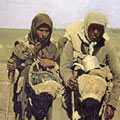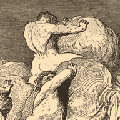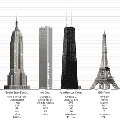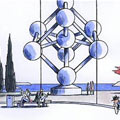honderd jaar geleden werd bij Ieper voor het eerst gifgas gebruikt
On April 22, 1915, the Germans launched their first and only offensive of the year. Known as the Second Battle of Ypres, the offensive began with the usual artillery bombardment of the enemy’s line. When the shelling died down, the Allied defenders waited for the first wave of German attack troops but instead were thrown into panic when chlorine gas wafted across no-man’s land and down into their trenches. The Germans targeted four miles of the front with the wind-blown poison gas and decimated two divisions of French and Algerian colonial troops. The Allied line was breached, but the Germans, perhaps as shocked as the Allies by the devastating effects of the poison gas, failed to take full advantage, and the Allies held most of their positions.
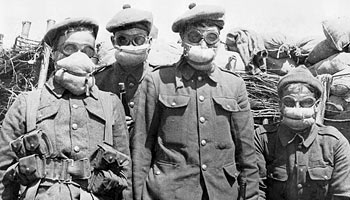
Ieper, 22 april 1915
Immediately after the German gas attack at Ypres, France and Britain began developing their own chemical weapons and gas masks.
history.com
A second gas attack, against a Canadian division, on April 24, pushed the Allies further back, and by May they had retreated to the town of Ypres. The Second Battle of Ypres ended on May 25, with insignificant gains for the Germans. The introduction of poison gas, however, would have great significance in World War I.
Immediately after the German gas attack at Ypres, France and Britain began developing their own chemical weapons and gas masks. With the Germans taking the lead, an extensive number of projectiles filled with deadly substances polluted the trenches of World War I. Mustard gas, introduced by the Germans in 1917, blistered the skin, eyes, and lungs, and killed thousands. Military strategists defended the use of poison gas by saying it reduced the enemy’s ability to respond and thus saved lives in offensives. In reality, defenses against poison gas usually kept pace with offensive developments, and both sides employed sophisticated gas masks and protective clothing that essentially negated the strategic importance of chemical weapons.
Bron: history.com
Immediately after the German gas attack at Ypres, France and Britain began developing their own chemical weapons and gas masks. With the Germans taking the lead, an extensive number of projectiles filled with deadly substances polluted the trenches of World War I. Mustard gas, introduced by the Germans in 1917, blistered the skin, eyes, and lungs, and killed thousands. Military strategists defended the use of poison gas by saying it reduced the enemy’s ability to respond and thus saved lives in offensives. In reality, defenses against poison gas usually kept pace with offensive developments, and both sides employed sophisticated gas masks and protective clothing that essentially negated the strategic importance of chemical weapons.
Bron: history.com







